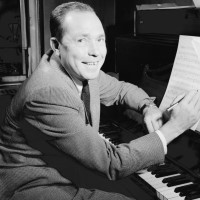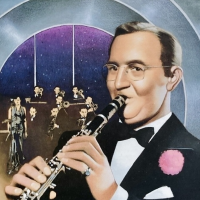Home » Jazz Musicians » Johnny Mercer
Johnny Mercer
When people write about Johnny Mercer, they usually talk about his fabulous career, the sheer quantity of his output, the speed and ease with which he wrote, his southern charm, the hip sophistication of his lyrics. But all this misses the real point. Ask anyone who writes lyrics. Johnny Mercer was a genius. He was born John Herndon Mercer on November 18, 1909 into an old Southern family in Savannah, Georgia. His father was a wealthy attorney with a flourishing real estate business, and young John was sent to a fashionable prep school, the Woodbury Forrest School in Virginia. However, when he was 17, his father's business collapsed, and his father found himself a million dollars in debt. Rather than declare bankruptcy, his father dedicated the rest of his life to paying off that debt, and suddenly young John Mercer, no longer able to go on to college, was on his way to New York City, hoping to make good as an actor. Acting, however, was not to be Mercer's destiny. He got a few bit parts, and took other jobs to survive, including a stint as a Wall Street runner, but his first small break came in 1930 when a song for which he had written the lyric was sung on Broadway in The Garrick Gaieties of 1930. In 1932, he won a singing contest and landed a job as singer with the Paul Whiteman Band. Whiteman introduced him to Hoagy Carmichael, and soon Mercer and Carmichael had a hit with "Lazybones" (1933). Composers quickly discovered his talent, and his career as a lyricist took off. In 1933, he moved to Hollywood, where he began writing songs for the movies. Meanwhile, his singing career continued to grow. He sang duets with people like Jack Teagarden and Bing Crosby. In 1938 and 1939, he was a singer with the Benny Goodman Band, and by the early 1940s he was popular enough to have his own radio show, Johnny Mercer's Music Shop. In 1942, together with fellow songwriter (and film producer) Buddy De Sylva and businessman Glen Wallichs, he founded Capitol Records and became Capitol's first President and chief talent scout. Soon, he had signed up such performers as Stan Kenton, Nat "King" Cole, Jo Stafford, and Margaret Whiting, and by 1946 Capitol was responsible for one sixth of all records sold in the U.S. In 1946, he teamed up with Harold Arlen to write the Broadway musical St.
Read moreTags
Clint Eastwood Presents Johnny Mercer: The Dream's On Me

by Samuel Chell
Johnny Mercer Clint Eastwood Presents Johnny Mercer: The Dream's On Me TCM 2009
Film director Clint Eastwood's love of jazz and American popular song is far from a secret, especially following his feature-length biopic about alto saxophonist Charlie Parker (Bird, 1988), during which the ever restless Eastwood got the idea to produce a feature-length film about pianist Thelonious Monk, released somewhat later during the same year as Straight No Chaser. Hence, it should surprise ...
Continue ReadingJohnny Mercer: Johnny Mercer

by Suzanne Lorge
In 1942 Johnny Mercer started Capitol Records with businessmen Buddy DeSylva and Glen Wallichs. At the time, Mercer was churning out hits for Hollywood, collaborating with composers like Jerome Kern, Harold Arlen and Richard Whiting. He recorded dozens of hits for the label during the 1940s, his amiable, untrained baritone in effect one of the voices that brought romance to a generation and soothed a nation at war. Sixty years later, Mosaic has released a three-disc set of some of ...
Continue ReadingStunning covers of Johnny Mercer and Freddie Hubbard among highlights of new album
Source:
Graham Taylor
Trumpet, meet master. In the hands of Steve Klenke, the trumpet becomes a paintbrush in which he can render stunningly beautiful imagery, from the playful innocence of a “Little Sunflower" to the awe-inspiring majesty of an “Evening Star." With or without words, the songs on Klenke's latest album, Tangerine, bloom in Technicolor. They are brightly lit and are brimming with good vibrations; combining jazz standards with his own timeless compositions, Klenke offers the best of the past and present with ...
read more
Johnny Mercer: Sunny Side Up

Source:
JazzWax by Marc Myers
Few voices do a better job of capturing post-war American optimism than Johnny Mercer's. His relaxed, upbeat and folksy style captured the nation's “new dawn" mentality perfectly. His songs between 1942 and 1947 have a Hollywood sensibility, and they effortlessly grab your heart. It's a happy voice that sounds like a one-armed bandit chugging out jackpot coins. A box set that captures his evolution perfectly—from too-cute by half phrase-turner to West Coast pop-swinger—is Johnny Mercer (Mosaic Select). Even though Mercer ...
read more
Riverwalk Jazz Johnny Mercer tribute this week

Source:
Don Mopsick
Johnny Mercer liked to say, “Writing music takes more talent, but writing lyrics takes more courage." If this is true, then Johnny Mercer's body of work—some 1,000 songs—is pure heroism. This week, vocalists Carol Woods, Stephanie Nakasian and Rebecca Kilgore join The Jim Cullum Jazz Band on stage at The Landing in San Antonio to salute Johnny Mercer in song. The show can be heard over the public radio airwaves, on XM/Sirius sattelite radio, and streamed from the Riverwalk Jazz ...
read more
DVD: Johnny Mercer

Source:
Rifftides by Doug Ramsey
Johnny Mercer, This Time The Dream's On Me (Warner Bros). Producer-director Bruce Ricker does a masterly job of integrating new and old material into a thorough biography of the great lyricist. The story of Mercer's life and artistry melds film clips and recordings of Bing Crosby, Fred Astaire, Frank Sinatra, Ella Fitzgerald, Louis Armstrong and Mercer singing his songs. Colleagues including Johnny Mandel and Tony Bennett offer assessments of his gifts, and Mercer himself reflects on his career. There is ...
read more
Linda Ciofalo's West Coast Tour Features Her CD Tribute to Johnny Mercer, Dancing with Johnny

Source:
Sound Visions Media
(New York, NY June 22, 2010) Linda Ciofalo makes her West Coast tour to sing selections from her latest CD, Dancing With Johnny. Ciofalo understands how to deliver a great lyric and on Dancing With Johnny, a special tribute to Johnny Mercer, she shines. Since Mercer is known for his endless brilliance as a first class writer of over 1,000 songs, Ciofalo is breath taking in her element. The songs showcase her tasteful vocal style and Ciofalo allows the strength ...
read more
Phil Collins Tapped for Johnny Mercer Award

Source:
All About Jazz
Veteran singer to receive songwriting honor
Phil Collins will get props for his writing chops when he receives the Johnny Mercer Award at the 2010 Songwriters Hall of Fame ceremony June 17 at the Marriott Marquis in New York. The singer-producer-drummer-composer-actor has been a hit-maker since assuming lead vocalist duties for the U.K. band Genesis in the mid-'70s, which led to a major solo career. He has authored such chart smashes as “In the Air Tonight," “Against All Odds," “In ...
read more
The Queen of Cabaret, Andrea Marcovici, Celebrates the Johnny Mercer Centennial at the Algonquin Hotel.

Source:
Miller Wright & Associates
ANDREA MARCOVICCI the celebrated singer and actress lauded as the greatest cabaret star of her generation by The International Herald Tribune and the epitome of elegance and showbiz savvy by Variety will celebrate the 2009 Johnny Mercer Centennial with the New York premiere of her new show Skylark: Marcovicci Sings Mercer at the Oak Room of the Algonquin Hotel (59 West 44th Street) from November 17 to December 26. Please call (212) 467-7444 for reservations. The only Mercer show to ...
read more
Other Matters: Mercer, Mercer, Mercer

Source:
Rifftides by Doug Ramsey
Today is the 100th anniversary of Johnny Mercer's birth. To celebrate it, Dave Frishberg and Rebecca Kilgore will be the guests on National Public Radio's Fresh Air with Terry Gross. See your local listings for station and time, or check here. If you live somewhere other than the United States or if your town doesn't have an NPR station, the network will archive the program here, usually late the day of the broadcast.
We may presume that, whatever Ms. Gross ...
read more
Johnny Mercer's 100th Birthday

Source:
Michael Ricci
The Johnny Mercer Centennial and City of Savannah celebrate Johnny Mercer's 100th birthday on November 18. “Come Rain or Come Shine" the life-size bronze statue America's great songwriter will be unveiled in the new Ellis Square at City Market. Johnny Mercer - perhaps most famous as the man who wrote the words of the southern lullaby, Moon River--is getting a posthumous 100th birthday celebration in his hometown of Savannah, culminating with the unveiling of Johnny's life-size bronze statue. The statue ...
read more
Johnny Mercer Honored in TCM Special Executive-Produced by Clint Eastwood

Source:
All About Jazz
Turner Classic Movies to Celebrate Legendary Singer-Songwriter Johnny Mercer as Clint Eastwood Presents JOHNNY MERCER: THE DREAM'S ON ME
In-Depth, Music-Filled Portrait of Mercer to Premiere in November, Commemorating 100th Anniversary of His Birth
“Hooray for Hollywood"; “Jeepers Creepers"; “That Old Black Magic"; “On the Atchison, Topeka and the Santa Fe"; “Skylark"; “Blues in the Night"; “Moon River"; “The Days of Wine and Roses." Some of the most beloved songs of the 20th century came from the pen of a ...
read more

































